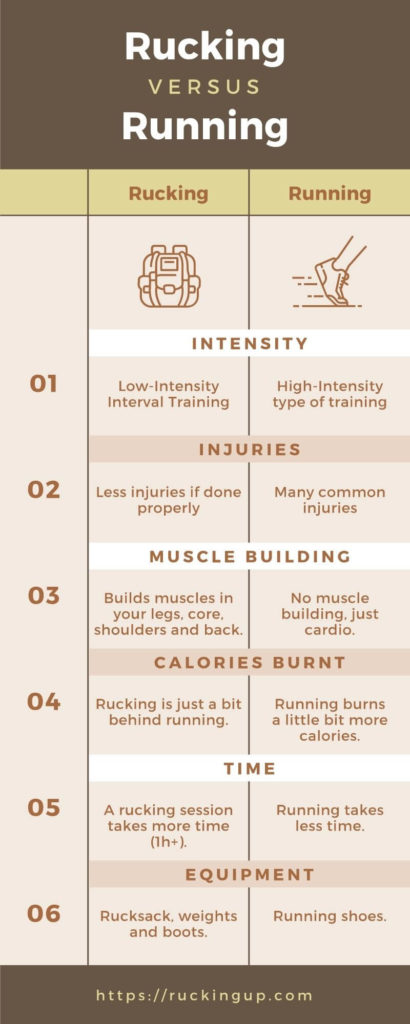Some people argue that rucking is better than running because it’s not as hard on your joints and you get a better workout. Others argue that running is better because it burns more calories and is easier to get into the habit of doing every day. However, there are also some who say that both have their benefits and that it’s just personal preference.
To help you decide, we’ve included the most important things to consider when deciding between rucking and running.
Rucking VS Running: Main Differences

Running is a popular exercise that many do on a regular basis. It’s been famous for quite some time and it’s known for multiple benefits. Running and rucking both have similar benefits, it just depends on your preference of which you like more.
Here are the main differences between rucking and running:
The Intensity of the Workout

In contrast to running, which is a High-Intensity type of training. Rucking can be considered a Low-Intensity Interval Training (LIIT) sport.
Running can also be a low-intensity interval training if you are jogging, for instance. You will need to run for a longer time period to get the most out of it, though. The principle of rucking is much more effective than jogging.
Moving quickly or slowly is basically irrelevant when determining the intensity of rucking. It’s easy to move quickly with little weight, but it will not yield as much benefit as you’ll experience from moving with a heavy load on your back. The best part about rucking is that you can control the amount of weight you carry and the length of your route.
Injuries
Injuries can be a very serious setback for athletes, and rucking vs running is a common debate among people.
Beginners think rucking to be a more physically demanding sport compared to running. But that is not really true. The “runner’s knee”, shin wounds, and the Achilles tendon are all common injuries among runners.
Rucking can lead to injury if you carry more weight than you can handle and you don’t maintain proper posture. If you avoid that you can ruck without being afraid of any injury.
Contrary to what you might think, rucking may actually be better than running for your joints because of its reduced stress on your feet and knees. Rucking also challenges your core muscles more than running does.
Muscle Building
Running is just cardio. Rucking, on the other hand, not only strengthens your muscles – but also builds muscle endurance. Carrying weight can strengthen your upper and lower body, while also helping you to improve your cardio.
As your back bears the extra weight, it will be putting other muscle groups into work. It’s like you just did an entire workout! So when it comes to muscle building rucking wins.
Rucking is More Social Than Running
One of the best parts of rucking is the company it provides. One way to avoid making rather boring rucking sessions is to keep it social. This will not only help you stay fit, but they’ll also provide you with an outlet to unwind.
The slow, easy pace makes it easier to keep talking while walking. In fact, it’s so effective as a form of diversion that you might forget you are even rucking.
The rucking events you can add to your social calendar are a great idea. Making new friends while you’re exercising is never a bad idea.
Similarities Between Rucking and Running
Now that you know what the differences are let’s take a look at the similarities of rucking and running.
Easy to Start
Rucking and running are easy-to-start sports that provide a great workout. All you need is a backpack and sturdy shoes, and you’re good to go.
The key difference between the two sports is that running does not require any additional weight on your body while rucking does. Ruckers start with 10%-15% of their body weight and 10%-15% more weight per week.
You can start rucking with a normal backpack but you can also spend quite a bit of money to get a military backpack and some rucking weights.
Calories
Both activities are tremendous calorie burners. An individual’s metabolic rate differs from one to another, age, weight, height, speed of movement being some of the variables.
If we take rucking for example, if a person who weighs 170 pounds carries at least 20 to 40 pounds on a flat surface, he or she would burn approximately 657 calories per hour.
When it comes to running before you can burn a ton of calories, you must determine how long you can run. Not everyone is capable of running for an hour at 6 mph. If you’re looking for an alternative, rucking might be a better option.
Health Benefits
When it comes to health benefits both rucking and running will help you get in shape without paying for a gym membership or personal couch. In addition, you will build discipline and maybe make some new friends.
Both Types of Exercises Can Help You Get a Better Posture

Rucking uses the weight of your pack to build up muscle, specifically in your core and lower back, which will then allow you to stand straighter. It also helps with the development of other muscles in your body.
Running will also help. You have to make sure to maintain a proper posture while running, your back will eventually straighten, eliminating pain and discomfort.
They are Outdoor Activities
Many people believe that exercising means going to the gym and staying indoors. That is not the case with running or rucking. You will exercise outside, breathe fresh air, and enjoy the surroundings.
Rucking and running are pretty much as good as if not better than a gym workout if you want to burn calories or to enhance your strength.
Why Would You Choose One Over the Other?
A common question people often ask themselves is which should I choose, running or rucking? There are many factors to consider when making this decision.
Overall both rucking and running will help you stay fit and be healthy but rucking can help you build muscles, endurance and give you the chance to meet new people and socialize.
Is Rucking Better Than Running?
Rucking is different from running in that you’re not only using your lower body, but also your upper body and core, which can make it more effective for weight loss or fat burning. You may also experience less stress on joints due to the lower impact on the ground with each step.
Is Rucking Good for Cardio?
Cardiovascular health is important to the body, and aerobic exercises are just one of the many ways that people can stay healthy. Rucking, which is defined as walking with loaded weight on the back, is an activity that may be good for you if you’re looking for new ways to get in shape. Compared to running, rucking may provide more benefits like burning calories and building strength.
Conclusion
If you’re looking for a new type of exercise to try, why not try rucking? There are many benefits to this workout that may just be the thing you need. Try it out! You might be surprised by the results.



